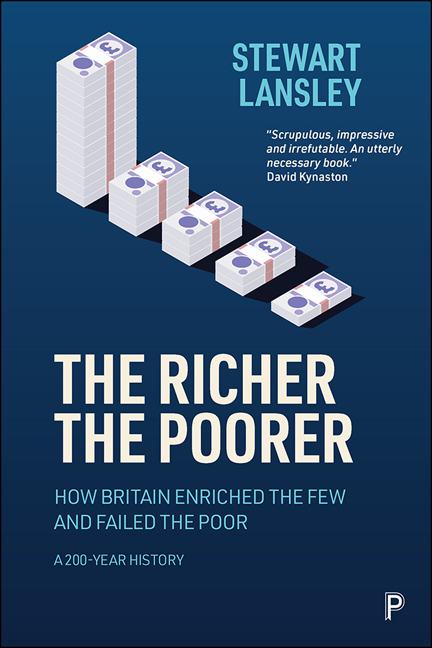Book contents
- Frontmatter
- Miscellaneous Frontmatter
- Dedication
- Epigraph
- Contents
- List of figures
- Preface and acknowledgements
- Introduction: Knighthoods for the rich, penalties for the poor
- PART I 1800–1939
- PART II 1940–59
- PART III 1960–79
- PART IV 1980–96
- PART V 1997–2010
- PART VI 2011–20
- Afterword: COVID-19 and ‘the polo season’
- Notes
- Index
15 - The dark shadow of the Poor Law
Published online by Cambridge University Press: 13 May 2022
- Frontmatter
- Miscellaneous Frontmatter
- Dedication
- Epigraph
- Contents
- List of figures
- Preface and acknowledgements
- Introduction: Knighthoods for the rich, penalties for the poor
- PART I 1800–1939
- PART II 1940–59
- PART III 1960–79
- PART IV 1980–96
- PART V 1997–2010
- PART VI 2011–20
- Afterword: COVID-19 and ‘the polo season’
- Notes
- Index
Summary
When Mrs Thatcher arrived in Downing Street, she inherited a middling social security system, one ungenerous by the standards of Northern Europe. Yet she was determined not to be seen as ‘soft’ on welfare. An early target was public spending. One of the government's first moves, overcoming some tepid opposition within the cabinet, was to freeze child benefit at the L4 rate.
With inflation high, this meant a serious cut in real terms. Geoffrey Howe also wanted to cut the state pension, but this time met stiffer cabinet resistance. Instead, he won approval for linking future pension increases to prices rather than average earnings, a move which had a significant negative impact on the future living standards of pensioners. During the 1970s, pension levels had broadly kept pace with wider income rises. Abolishing the earnings link was a big money saver, but meant that the state pension would fall in relative terms over time. Patrick Jenkin claimed that pensioners would continue to share in the ‘increased standards of living of the country as a whole’. It was an empty promise. Between 1980 and 1995, the basic pension fell from 26 to 17 per cent of average earnings, one of the lowest ratios in Europe. There were also cuts in the value of other benefits, including invalidity benefit, while the earnings-related additions to unemployment and sickness benefit were abolished.
A war of attrition
The war on benefits was a decisive moment in the politics of social security. This was the first time since the early 1930s that a government had launched an explicit policy to cut the real value of benefits, and deliberately removed the promise of social advance for all citizens so carefully built over the previous twenty-five years. While there was little vocal public opposition, there were loud protests in the House of Commons, with the parliamentary committee handling the 1980 Social Security Bill suspended twice. ‘The ease with which the government got away with such a harmful piece of legislation made this one of the most profoundly depressing moments in all my time with the Child Poverty Action Group’, wrote Ruth Lister, who became the director of the group in 1979. What had been launched was ‘a steady war of attrition’ which made it ‘hard to mobilise effective defence’.
- Type
- Chapter
- Information
- The Richer, the PoorerHow Britain Enriched the Few and Failed the Poor: A 200-Year History, pp. 133 - 143Publisher: Bristol University PressPrint publication year: 2021



